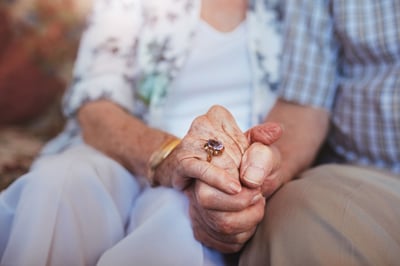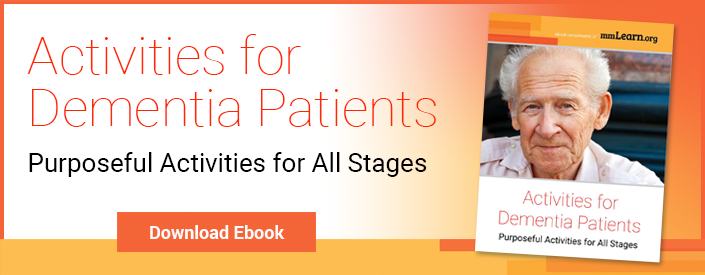 Intimacy can be an uncomfortable subject for people with dementia and their family members. Changing sexuality caused by dementia makes this particularly challenging for family caregivers.
Intimacy can be an uncomfortable subject for people with dementia and their family members. Changing sexuality caused by dementia makes this particularly challenging for family caregivers.
Let's take a closer look at common intimacy‑related dilemmas faced by caregivers. We'll also outline tips to cope with these changes.
How Dementia Affects Sexuality
The intersection of dementia and sexuality varies from person to person.
Oftentimes, sexual connection slowly wanes. Sometimes partners of people with dementia feel it’s no longer acceptable to have sex. Other times, both caregivers and patients lose interest in sex. In some cases, partners feel emotionally disconnected from each other.
In other situations, individuals with dementia develop an unnaturally strong interest in sex. We call this hypersexuality.
Hypersexuality can manifest in several different ways:
- frequent masturbation
- inappropriate sexual overtures toward partners
- inappropriate sexual behavior toward caregivers and others
Sometimes it's possible to manage hypersexuality by addressing underlying emotional needs. In other cases, seniors need medication. That’s because, as dementia progresses, changes occur in the brain.
These changes can lead to the following issues that exacerbate or trigger hypersexuality:
- Loss of inhibition
- Increased sexual desire (libido)
- Physical agitation
- Inability to recognize sexual partners
- Inability to recognize themselves and regulate their behaviors
Family caregivers often feel frustrated and helpless to manage these changing behaviors. It’s challenging for everyone when private behavior becomes public.
In this video, Dr. Beth Goethe, Ph.D., and Dr. Martha Leatherman, M.D., offer more information on how dementia affects sexuality.
The Intimacy Imperative
Dementia doesn't negate an individual's need for human affection, touch, and intimacy. Caregivers need to validate seniors’ feelings and desires for connection. The need for physical touch can be fulfilled in non‑sexual ways such as:
- Hand‑holding
- Hugging
- Dancing
- Cuddling
- Massage
Quality time together also fosters connection and intimacy. Try to incorporate regular meaningful activities such as:
- Sharing a meal
- Seeing a movie
- Playing a simple game together
- Reminiscing together about days gone by
It’s normal for affection and activities to evolve as your loved one’s dementia progresses. It’s also common for an older adult with dementia to get confused during quality time together. Some mistake their caregiver for a spouse, see their caregiver as a “new love,” or mix up members of the family. This can lead to confusing, unsettling sexual overtures.
In this video, Drs. Goethe and Leatherman offer support and reassurance for dealing with these challenging situations.
How Caregivers Can Cope with Dementia and Sexuality
Remember that startling or abnormally sexual behaviors are not personal. Rather, they’re symptoms of a disease. It’s natural for you to experience a variety of emotions in response to inappropriate behaviors:
- Frustration
- Anger
- Sadness
- Grief
Get outside help
Many caregivers find it helpful to talk through difficult emotions. You can confide in a trusted peer, counselor, or member of the clergy. There are also resources to help you understand and respond to seniors’ changing needs:
- The podcast, "A Caregiver's Approach to Sex, Dementia, and Intimacy"
- The Alzheimer’s Association’s “Changes in Sexuality and Intimacy”
- Dementia support groups
If the combination of dementia and changing sexuality are interfering with the aging senior's daily life, talk to their medical team. This is also good advice if the behavior is negatively impacting you or other family members. A doctor can help navigate the intersection of dementia, sexuality, and other underlying medical causes.
Prepare to adjust with time
One last thing to keep in mind: As dementia progresses, the needs and expectations of both caregivers and care receivers change. What works today may no longer suffice tomorrow.
Every individual and situation is different. That means there's no clear prescription for caring for a loved one with hypersexuality. There's no single answer for how to relate to adapt your sexual relationship with a partner with Alzheimer's. Regardless, experts recommend adopting a pragmatic outlook.
Approach these changes with an open mind and loving heart. Try to develop an understanding of the role dementia plays in your loved one's sexual attitudes and behaviors.

